December 2009
NDI and its Partners Observe, Assess and Report on Elections in Afghanistan, Honduras, Kosovo and Tunisia
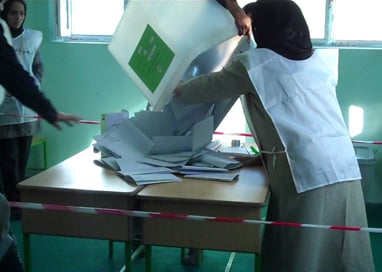 In recent weeks, NDI and its local partner organizations were on the ground to observe, assess and report on elections in Honduras, Kosovo and Tunisia, and the cancelled presidential runoff election in Afghanistan. In recent weeks, NDI and its local partner organizations were on the ground to observe, assess and report on elections in Honduras, Kosovo and Tunisia, and the cancelled presidential runoff election in Afghanistan.
NDI was preparing to observe the Nov. 7 runoff when the Afghan Independent Election Commission cancelled the vote and declared Hamid Karzai the winner. In the days before the runoff, NDI issued a series of recommendations suggesting ways to improve security and prevent the massive fraud that marred the Aug. 20 general election. The Institute's election analysts prepared several reports looking ahead to procedures for the runoff and analyzing the results of a fraud audit of the Aug. 20 polls conducted by election authorities. After the election was cancelled, NDI noted that the questions of fraud surrounding the August vote had not been fully addressed and called for a high-level commission to conduct an inquiry into the problems. An op-ed piece on the Huffington Post by NDI's regional director for Asia, Peter Manikas, pointed out the importance of the inquiry as a credible first step in the new government's anti-corruption campaign, as a means to enact meaningful reforms before legislative elections scheduled for next year.
In Honduras, NDI conducted an international election assessment mission for the Nov. 29 general elections. In a statement after the vote, the Institute noted the special challenges presented by the sharp divisions within the country and between Honduras and the international community after the ouster of President Manuel Zelaya on June 28. NDI's assessment mission did not take a position on these larger political issues; rather, it sought to provide an impartial assessment of the conduct of the electoral process. NDI also worked closely with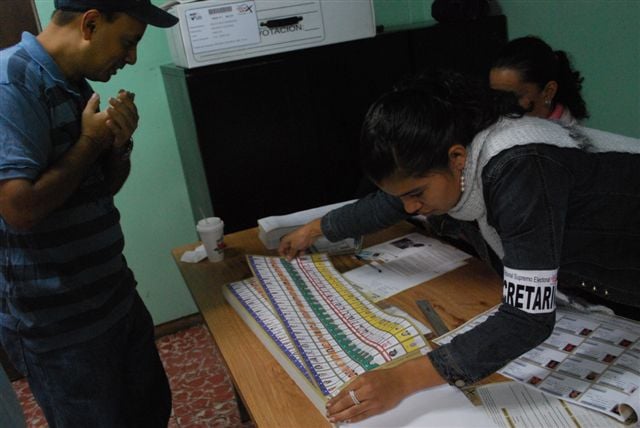 its local partner, Hagamos Democracia, a nonpartisan domestic election monitoring organization. Hagamos dispatched more than 1,000 observers to all 18 departments and 283 of the 298 municipal districts and released three election bulletins. Its "parallel vote tabulation" accurately projected the results of the presidential race. its local partner, Hagamos Democracia, a nonpartisan domestic election monitoring organization. Hagamos dispatched more than 1,000 observers to all 18 departments and 283 of the 298 municipal districts and released three election bulletins. Its "parallel vote tabulation" accurately projected the results of the presidential race.
Kosovo's municipal elections on Nov. 15 were the first polls conducted there since the nation became independent last year. NDI was on the ground before the election and released a pre-election assessment with recommendations for the vote, as well as how to improve the system in the future.
In Tunisia, political parties united to observe voting around the country for the first time since the country began holding multiparty elections a decade ago. After months of preparation, and with assistance from NDI, senior members of the Ettajdid (Renewal) Movement and the Democratic Forum for Labor and Liberties (FDTL) deployed 400 party agents to polling stations on election day, Oct. 25. The two parties then analyzed their results to identify common problems surrounding the administration of the election. Read more»
|
|
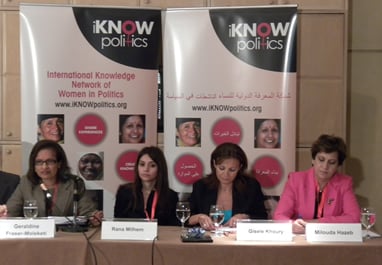 iKNOW Politics, an online network dedicated to the advancement of women in politics, launched a new Arabic language version in Amman, Jordan, in October opening it up to potentially millions of new users in a region where women are underrepresented politically. iKNOW Politics, an online network dedicated to the advancement of women in politics, launched a new Arabic language version in Amman, Jordan, in October opening it up to potentially millions of new users in a region where women are underrepresented politically.
The site had 23,000 visitors last month and 6,100 are registered members who contribute to online discussions and share resources.
About 150 women leaders, political candidates, activists and representatives of women’s organizations primarily from the Middle East and North Africa attended the two-day launch event, which focused on the impact of media and information technology on the number and effectiveness of women in politics in the region.
NDI is one of five partner organizations in the project, along with International IDEA, the Inter-Parliamentary Union, UNDP and UNIFEM.
Read more»
In Liberia, NDI is working to help connect lawmakers with their constituents and foster open and substantive public policy debates. To aid that effort, the Institute has partnered with STAR radio to launch a weekly program, The Legislative Spotlight. The roundtable discussion features different topics and legislators each week, and has helped lawmakers to address key public policy issues with constituents who call in to the program.
Read more and listen to a clip from the program»
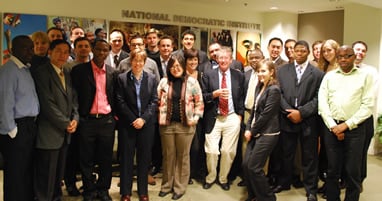 Parallel vote tabulations (PVTs), a powerful citizens' tool to analyze the integrity of voting and counting processes as well as the accuracy of official election results, were the subject of a "PVT Academy" held at NDI's Washington office Nov. 17-20. Some 23 participants from 17 countries, all experienced in conducting PVTs, came together to share expertise and harmonize best practices. Parallel vote tabulations (PVTs), a powerful citizens' tool to analyze the integrity of voting and counting processes as well as the accuracy of official election results, were the subject of a "PVT Academy" held at NDI's Washington office Nov. 17-20. Some 23 participants from 17 countries, all experienced in conducting PVTs, came together to share expertise and harmonize best practices.
The participants — from Africa, Asia, Central and Eastern Europe, Eurasia, Latin America and the Middle East — included leaders from citizen groups who have joined NDI in conducting PVTs, NDI staff and consultants who are PVT experts. They came together to share lessons learned and explore nuances in PVTs, which demand precision in training, communications, analysis and reporting.
Read more»
|
|
Though Iraqi women are slowly increasing their involvement in government, political parties and civil society organizations, they are still largely absent from decision-making positions within those bodies. To improve that situation, more than 200 women and men from a range of parties, regions and occupations came together in Erbil, Iraq, Oct. 31 – Nov. 2 to develop a unified vision for a National Platform for Women in advance of parliamentary elections scheduled for next March.
Conference participants chose four issues to be the major components of the platform: healthcare, education, employment and political participation. Proponents hope the platform will be at the center of the debate between parties and candidates in the upcoming elections.
Read more»
To address a pattern of historic exclusion and marginal-ization among Mayan women in Guatemala, NDI has partnered with the Political Association of Mayan Women (Asociación Política de Mujeres Maya) to organize an indigenous women's political leadership academy. Its goal is to provide the women with the skills needed to participate in political life in Guatemala at all levels, including obtaining leadership roles in political parties, participating in local advisory councils and promoting women's issues in civil society organizations.
Read more »
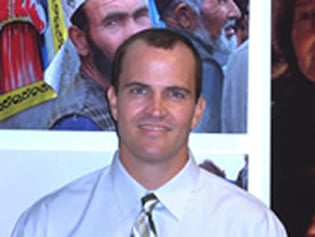 Afghanistan's provincial councilors (PCs), the only elected officials who interact with citizens at the local level, have seen their roles change and expand since their offices were created four years ago. Many of them had little political experience, so they’ve had to learn on the job. NDI has played a significant role in that learning process. Afghanistan's provincial councilors (PCs), the only elected officials who interact with citizens at the local level, have seen their roles change and expand since their offices were created four years ago. Many of them had little political experience, so they’ve had to learn on the job. NDI has played a significant role in that learning process.
Devin O’Shaughnessy, NDI’s resident senior program manager in Kabul, recently explained how NDI has worked to support PCs through their first four years in office and discussed the challenges that await the newly-elected and returning PCs who won seats in Afghanistan’s Aug. 20 elections.
Read more»
|